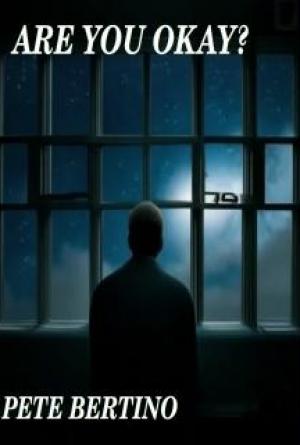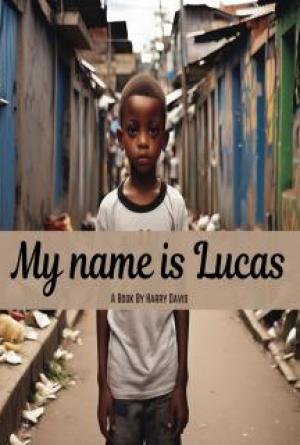PLEASE PASS THE CREAM
SCENE: Dining-room of the CLARKS, cosily furnished in dark; dining-table in center, two chairs at opposite ends, table set with plates, knives, forks, spoons, glasses, coffee pot and cups at right end, with sugar and a cream-pitcher; plate, knife, fork, spoons, glass at left end; also a carafe of water; butter, salt and pepper boxes, napkins, etc. A sideboard with silver. Rug under table. Modern hanging lamp over it. Doors at right and left. Window at back beside sideboard. Telephone on small table in left corner. MR. CLARK, about 40 years of age, stout and easy going, seated in chair at left end of table. MRS. CLARK, about 35 years old, rather slim and nervous, at the right end. As the curtain rises both are eating some meat and potatoes, a clock in hall behind door at right striking the hour of eight.
MRS. CLARK (raising her napkin to her mouth). I wish you wouldn’t say “it don’t,” John. That isn’t grammatical!
MR. CLARK (raising a piece of potato on his knife to his mouth). It ain’t—why isn’t it?
MRS. C. (dropping her napkin to the floor, in a voice of utter horror). Oh, John, John! How many, many times have I besought you not to use that terrible, terrible word “ain’t”?
MR. C. (very cheerfully, raising another piece of potato on his knife). I dunno, Martha. I never was much good at mental arithmetic.
MRS. C. (picking up her napkin, mournfully). John, don’t you remember that you promised me when we were engaged never more to utter that abominable word.
MR. C. (cutting awkwardly at his meat). I ain’t quite sure that I made such a promise, Martha.
MRS. C. (sharply). John Clark, you certainly did make such a promise—not once but several times!
MR. C. (starting to raise a piece of meat to his mouth, letting it fall). But, Martha, that was only an engagement promise, and engagement promises ain’t no wise binding, so to speak, after the wedding march is ended.
MRS. C. (angrily, again dropping her napkin). Mr. Clark, if you utter that word again I shall withdraw from the table!
MR. C. (still cutting away awkwardly at the meat). All right, Martha. I won’t use that word no more.
MRS. C. (picking up her napkin, sharply). John Clark, what you have just said is also ungrammatical. It is very incorrect for you to say “I won’t use that word no more.”
MR. C. (raising another piece of potato on his knife). But, my dear, I don’t see why it is incorrect for me to say that I won’t use the word “ain’t” again. Now you’re blaming me for not using it.
MRS. C. (a little confused). You know very well what I mean! (Suddenly and more sharply.) John, how many times have I requested you not to eat with your knife?
MR. C. (letting his knife fall out of his hand to the floor). But what is a knife for if it isn’t to eat with?
MRS. C. (in tone of utter disgust). Oh, won’t you ever speak correct English. Why couldn’t you have said, “What is the purpose of a table-knife if it is not to use in eating?”
MR. C. (very cordially, reaching down to pick up the fallen knife). You are exactly right, my dear. I agree wholly with you—the purpose of a table-knife is to be used in eating.
MRS. C. (very sharply). But a table-knife is not a freight elevator, John Clark!
MR. C. (starting to raise more potato on his knife). No, Martha, a fork is the proper instrument with which to convey a piece of meat from one’s plate to one’s mouth.
MRS. C. (rising hastily, speaking quickly). John, stop that! Never use a knife, even at home, that has fallen to the floor! (Goes to the sideboard, opens a drawer, takes out a table-knife and exchanges this knife for the one just dropped by MR. C.) There! (Resuming her seat.) Don’t you dare to misuse this knife as you misused the other one, John Clark!
MR. C. (rather humbly). No, ma’am! Still, it’s ever so much easier to eat with my knife than with my fork.
MRS. C. (decidedly, beginning to eat again). No, it isn’t! Besides, it’s very vulgar—and dangerous, too.
MR. C. (now using his fork). Yet I’ve read somewhere—I know I have—that George Washington ate with his knife in the same way that I did.
MRS. C. (quickly). Oh, well, forks were not invented then.
MR. C. (drinking from his glass of water). They never should have been invented. Fingers are ever so much better than forks.
MRS. C. (rising from her seat to go again to the sideboard). I expected you to say that fingers were invented before forks. How did it happen that you forgot to make that remark—again?
MR. C. (using his napkin very clumsily). Really I can’t see why an honest hungry man should be ashamed of eating with his knife.
MRS. C. (returning to her seat with the sugar tongs). Well, it’s not the correct thing socially. Mrs. James’s husband never eats with his knife. (Quickly.) John, that isn’t a wash towel; it’s a napkin.
MR. C. (dropping the napkin to the floor). I wish that Mrs. James’s husband would pay that $100 he has owed me for a year.
MRS. C. (beginning to pour out the coffee). You should feel proud that a gentleman of such high social position as Mr. James owes you a hundred dollars.
MR. C. (picking up the napkin). Well, when a dozen other gentlemen of high social position have each owed me a hundred dollars for more than a year I don’t feel so proud of Mr. James’s owing me a hundred plunks.
MRS. C. (beginning to put in some sugar with the tongs into the cup of coffee). Not a hundred plunks, dear. You mean a hundred dollars.
MR. C. (a little crossly). I mean just what I say—a hundred plunks! Perhaps if he ate with his knife and said “ain’t” the way I do he would never have borrowed them hundred plunks.
MRS. C. (in utter horror). “Them hundred plunks!” Oh, John!
MR. C. (angrily). Ye-es, them hundred “bucks”! (More angrily.) Now, see here, Martha Smith, I am a ve-ry patient man. My father was a patient man and my mother was the most patientest woman you ever did see; but they have had their limits, and so have I. (Bringing his hand down firmly upon the table.) And when I get real riled I ain’t nearly as agreeable as aforetimes. (Pauses for a moment as though to emphasise his remarks.) As I said, I am a ve-ry patient man, but I have my limit. Now, Martha Smith, you have been a-pestering me all breakfast time, and a-correcting me on my expressions of speech. Also, you have been fault-finding with my table manners, and I have got ve-ry tired of it. Now, I want you to understand, Martha Smith, right here, that I won’t tolerate another word from you (he rises and then bangs his fist hard upon the table), and I’ll say “it ain’t,” “it hain’t,” “it don’t” as often as I darn please! And I’ll eat with my knife or my fingers as often as I darn please! (Raising his voice still more.) Do you understand that, Martha Smith? (He glares angrily at her.)
MRS. C. (very coolly and very deliberately). Mr. Clark, you are so amusing when you get “real riled.” If you could only see yourself (mimics him) “when you ain’t nearly as agreeable as aforetimes.” Now, I never get angry myself, never. And at any rate not after seeing you in a tantrum. It’s too disgusting. You are not a handsome man, even when you are agreeable, Mr. Clark; but when you are really “riled,” my! you’re homely, as homely as—well, words fail me! (She laughs somewhat irritatingly.)
MR. C. (walking furiously up and down the left side of the room, savagely). If you only was a man for a minute!
MRS. C. (more coolly and deliberately). I wish I were for only half a minute.
MR. C. (walking more furiously, speaking more savagely). It is no wonder your first husband died!
MRS. C. (rising quickly from her chair). What do you mean, Mr. Clark? (Then she reseats herself just as quickly.) No, I never get angry myself, never, and I’m not going to become angry this time. (She rises again and carries the cup of coffee she has poured out, placing it at his end of the table.) You see how calm I am, Mr. Clark—how very calm. (She returns to her seat with a martyr-like smile.) If I were you I should drink that coffee before it gets cool.
MR. C. (pausing in his walking angrily). I don’t want any coffee! (More angrily.) Martha Smith, I asked you if you understood?
MRS. C. (with great dignity). Mr. Clark, please remember that I am Mrs. Clark.
MR. C. (in a lower tone). Guess I’ll never forget that!
MRS. C. (beginning to pour out some coffee for herself). Don’t you think you had better drink your coffee? It must be getting cool.
MR. C. (with a flash of anger). Oh, darn the coffee!
MRS. C. (putting in two lumps of sugar). Just as you please, Mr. Clark, just as you please.
MR. C. (sitting down sulkily in his seat). Martha Smith, this nagging of yours is getting on my nerves.
MRS. C. (pouring from the cream-pitcher into her coffee). I remarked a short while ago that I am Mrs. Clark!
MR. C. (settling down into his chair). Well, because you are Mrs. Clark doesn’t give you any right to nag me.
MRS. C. (stirring her coffee). I am not nagging you. I have never nagged anybody in my life, but when you said “them hundred plunks”—oh, horrors!
MR. C. (beginning to finger his coffee spoon). But what should I have said?
MRS. C. (still stirring her coffee). What should you have said? Why—why—“those hundred dollars,” of course.
MR. C. (in a grumbling tone). It’s too blamed bad that a man can’t speak as he wants to in his own home.
MRS. C. (sipping her coffee). You may, John, providing that you follow the rules of grammatical English, as are observed by our best society.
MR. C. (less sulkily, still fingering his coffee spoon). What do you mean by our best society, Martha?
MRS. C. (a little perplexed). Our best society? Oh—yes—er—why, our best society means those that are in the best society—those who are the recognized leaders of society—the men and women who are socially “it.”
MR. C. (quickly). Martha! “Socially it”? I am surprised to hear such an expression fall from your lips. “Socially it”! Why, what a vulgar phrase. You should have said, “Our best society consists of those men and women who are the leaders of élite society!”
MRS. C. (with much dignity). Your coffee must be cold by this time, John. Let me give you another cup?
MR. C. (rather gleefully). No, Martha, this coffee is all right; but haven’t you forgotten something?
MRS. C. (still with dignity). What is it I have forgotten?
MR. C. (cheerfully). The milk, Martha, the milk. Please pass the milk.
MRS. C. (reprovingly). Of course you mean the cream, John. (Passing the pitcher.)
MR. C. (receiving the pitcher). No, I mean the milk.
MRS. C. (rather sharply). But, my dear, it isn’t milk; it’s cream.
MR. C. (obstinately). It is not! It’s milk. (Spelling it.) M-i-l-k, milk!
MRS. C. (stirring her coffee). It is not milk, John. Milk is what the cows give—this is cream!
MR. C. (with a grin, still holding the pitcher). I never knew before that cream does not come from milk. Very remarkable!
MRS. C. (a little confused). Now don’t try to misunderstand me. Of course milk comes from cream, and that pitcher contains cream, not milk.
MR. C. (with another grin). Martha, I never knew before that milk comes from cream.
MRS. C. (with dignity). That was a slip of my tongue.
MR. C. (gleefully). Yes, just as when you say that this pitcher contains cream.
MRS. C. (sharply). It does contain cream, and not milk!
MR. C. (pouring some of it from the pitcher into a glass). Now, see there. Do you call that cream? Cream! It’s more like skim milk.
MRS. C. (wearily). Can’t you comprehend, John? Socially it is cream. You never ask for milk in your coffee but always for cream.
MR. C. (impatiently). I don’t care one continental what it is socially. Practically it is milk. (Drinking from the glass into which he has poured from the pitcher.) YES, that’s milk all right. (Pushing the pitcher towards MRS. C.) Taste it yourself Martha. See if it isn’t milk.
MRS. C. (nervously sipping her coffee). That isn’t the point at all. Of course when it’s in a drinking glass it may be milk, but when it’s in a cream-pitcher it is always cream.
MR. C. (still more impatiently). But pouring it into a drinking glass doesn’t change its real nature. If it’s milk, it’s milk, and if it’s cream, it’s cream!
MRS. C. (again sipping her coffee). Yes, it is just the same in the pitcher as it is in the glass, only we call it, politely, cream when it is in the pitcher and milk when in the glass.
MR. C. (crossly). Well, what has politeness to do with it, anyway? If it’s milk in the glass it will be milk when it’s in the pitcher.
MRS. C. (sipping her coffee with a half smile). Don’t you see, John, that it’s cream when it’s in the cream-pitcher?
MR. C. (still more crossly). I suppose that if that pitcher contained only water it could be called cream!
MRS. C. (putting down her spoon and drinking her coffee). You are aw-fully stupid—when you want to be, my dear.
MR. C. (rising quickly and going over to the telephone). You needn’t take my word for it. We’ll have some one else’s opinion. (Takes down the receiver.) Hello! Give me Main 203. (Turns to MRS. C.) I’m going to talk with Joe Williams. He’s head of the Wholesale Milk Company. (Speaking into ’phone.) Hello! Is this Joe? I’m John Clark. You see, Joe, my wife and I have had a slight dispute. She declares up and down that the milk we are using on our breakfast table is cream, and not milk at all. I say that it’s milk—no matter whether it’s in a cream-pitcher or not. She says that as long as it’s in a cream-pitcher it’s cream and not milk. Now, Joe, am I right? It’s milk, because I have drunk some of it and I remember that Mrs. Clark told me this morning the milkman had forgotten to leave the cream. (Pauses a moment.) What’s that? You think I am right, but you are going to ask your wife and will call me up soon? Thank you, Joe. (He replaces the receiver and returns to his chair.)
MRS. C. (with a sweet smile). I am sorry, John, that you have had to call for assistance, but Mrs. Williams will, I am sure, wholly agree with me.
MR. C. (sourly). Well, I was brought up on a farm and I ought to know the difference between milk and cream.
MRS. C. (with a very sweet smile). I guess you were brought up on a farm all right.
MR. C. (angrily). So were you! I found it out only a short time ago. (Laughing softly.) Ha! ha! ha!
MRS. C. (mimicking him). Ha! ha! ha! ha! Now, I’m not going to lose my temper, whatever you may say. I never get angry myself—no, never!
(The telephone rings.)
MR. C. (hastening to the telephone). Now we shall see! (Takes down the receiver.) Hello! Hello, Joe. Oh, good morning, Mrs. Williams. How do you do? Yes, thank you, both my wife and I are pretty well. What did you say? (Listens while she is speaking.) Is that so? It is? I understand. What did you say? Oh, of course socially—yes—yes! No, our dispute is not serious; only a difference of opinion. As I told your husband a very slight difference. Thank you for your trouble, Mrs. Williams. Will you please ask Mr. Williams to come to the telephone a moment? O! He has gone for the day? Thank you—good-bye. (Impatiently hangs up the receiver.)
MRS. C. (laughing heartily). Ha! ha! ha! ha! ha! ha! ha! What did I tell you, John? Didn’t Mrs. Williams agree wholly with me?
MR. C. (reseating himself). Yes, of course she did. I expected that, but Joe, I’m sure, believes that I am right. You see he didn’t dare to tell me his real opinion when his wife was there. Probably he will visit us a little later and convince you that you are wrong. But he didn’t have the courage to say so in the presence of his wife. Isn’t it too bad, Martha, that Joe hasn’t some of my independence?
MRS. C. (a little angrily). I hope that Mr. Williams is not as stupid as you are—sometimes. (More angrily.) John, how very obstinate you are! You know well enough that I have the right of it, and yet you won’t admit it.
MR. C. (slowly stirring his coffee). After all, Martha, I think I’ll have some coffee. Will you please pass me the milk?
MRS. C. (with considerable temper). John Clark, I never get angry myself, never, but certainly you do try my patience—sorely. Now, I don’t want you to call that cream milk—again! Not again! (She rises from her chair.)
MR. C. (still stirring his coffee). Martha, will you please pass me the—milk?
MRS. C. (angrily stamping her foot). John Clark, how dare you!
MR. C. (calmly). Martha, will you please pass me the milk!
MRS. C. (in a furious temper, stamping her foot and then pounding upon the table). It ain’t milk—it ain’t!
MR. C. (with mock seriousness). Martha! It ain’t! That is not grammatical. Oh, that terrible, terrible word—ain’t!
MRS. C. (very furiously). I never said ain’t—never—never—never!
MR. C. (very mournfully). You did, Martha—you did. I heard you. You said, “It ain’t no milk!”
MRS. C. (wildly seizing the cream-pitcher and suddenly dashing it and its contents to the floor, in view of the audience). There—darn it!
MR. C. (rising quickly). Hold on! That is Grandmother Smith’s old cream-pitcher!
MRS. C. (in despair). Oh, what have I done! (She stands for a moment, looking silently at the ruins of the prized cream-pitcher, and then sinks into her chair, pulling out her handkerchief and weeping hysterically.)
MR. C. (standing as though dazed, gazing upon the shattered pitcher.) Gee whiz! (Taking a step forward towards MRS. C., speaking kindly, placing his right hand gently upon her shaking shoulders.) Well, Martha, don’t feel so badly about it—it ain’t any use to “cry over spilt milk!”
MRS. C. (suddenly rising from her chair, glaring at MR. C.). It isn’t spilt milk—it’s spilt cream!
CURTAIN.







